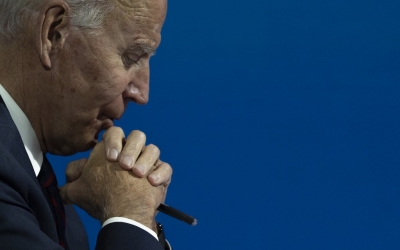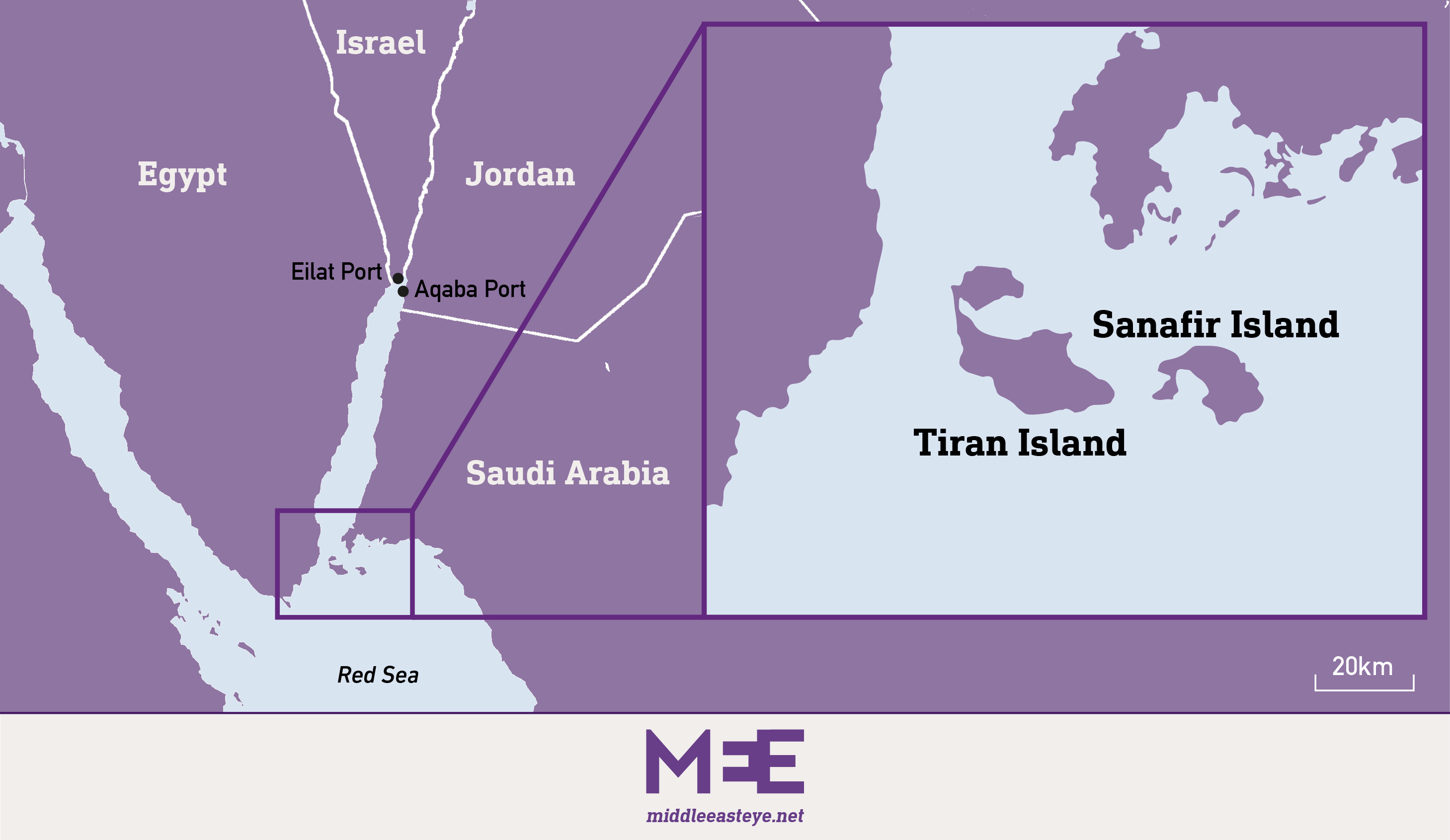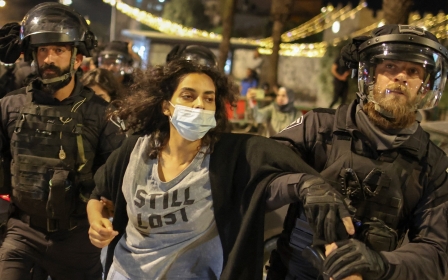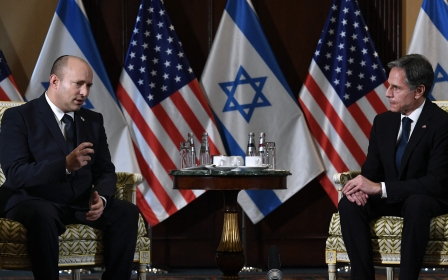Biden is fiddling as Jerusalem burns

Quietly and without a murmur, the Middle East policy of US President Joe Biden appears to be performing what stunt riders call a handbrake turn.
Biden is veering away from his signature policy, a nuclear deal with Iran, and lurching towards Saudi normalisation with Israel, which was the major piece of unfinished business of former President Donald Trump’s Abraham Accords.
After this stunt has been performed, Biden’s Middle East policy will be all but indistinguishable from Trump’s. Qatar will no longer be under siege but Iran will remain under maximum sanctions, and all US attention will be on growing Israel’s links with the region.
All of this is pushing rapidly in the direction of Saudi normalisation with Israel, the jewel still missing in the crown of the Abraham Accords
For all his naked mercantilist ambitions - backing illegitimate despots in return for his 30 pieces of silver - Trump’s legacy in the Middle East is enduring. Having denounced both its de facto ruler and the kingdom of Saudi Arabia itself as a “pariah” state, Biden seems to be only too willing to deal with pariahs. He is following sheep-like in Trump’s footsteps.
The clearest indication of this is what Biden has done to the draft agreement to reinstitute the Iran nuclear deal, from which Trump unilaterally withdrew four years ago. The product of 11 months of talks with two Iranian administrations, the US walked away at the end of March with what a State Department spokesman described as a “small number” of outstanding issues.
New MEE newsletter: Jerusalem Dispatch
Sign up to get the latest insights and analysis on Israel-Palestine, alongside Turkey Unpacked and other MEE newsletters
Since then, lead American negotiator Rob Malley has been denounced in the US media as too dovish on Iran. His proposal to remove the Islamic Revolutionary Guard Corps (IRGC)’s designation as a Foreign Terrorist Organisation (FTO) has been overruled by Biden, and the whole deal seems to be heading for the sands.
Malley’s latest public assessment is that the chances of striking a deal are “at best tenuous”. Privately, Malley is frustrated - and by no means is all of that frustration directed at Iran.
Contradictory signals
On the Iranian side, there is bemusement that the FTO issue is the deal-breaker. This declaration is almost entirely rhetorical, and lifting it would not affect the US Treasury sanctions on the IRGC, which would continue. But this is not the only issue. The American side has also been wavering, or sending contradictory signals, on the two issues that are key to this deal: verification and sanctions relief.
Let us be clear: Iran, under this deal, would have agreed to almost all of its 60-percent-enriched uranium being shipped out of the country in return for Russian yellowcake.
Suddenly, everyone has stopped talking about this. No one is talking about the ability of Iran to reach “nuclear breakout”, which we were told could be only a matter of days away. If the genuine aim was to stop Iran from having the capacity to get a bomb, here is the US walking away from a deal that verifiably deprives Tehran of that capacity.
If the US and Israel were as concerned as they claim to be about the prospect of Iran manufacturing a bomb, and the ensuing nuclear proliferation in the Gulf, then why is one party walking away and the other applauding it for doing so?
Coincidentally, the well-informed Barak Ravid reports that one of Israel’s most senior defence officers, retired Brigadier General Dror Shalom, told State Department officials on a recent visit that the US made a mistake by exiting the Iran deal in 2018. Shalom argued that the exit brought Iran closer to a nuclear weapon.
If you follow that logic, why would you not want to sign the deal as it now exists?
Of course, the Iranians could say that their nuclear enrichment programme was always used by the West as a pretext for sanctions. The real aim of sanctions was to bring about regime change in Iran - and I don’t think, on this evidence, they are wrong.
Two uninhabited islands
But the shelved deal with Iran is not the only sign of Biden’s shift. His officials have alighted on the outstanding issue of the transfer of two strategically placed but uninhabited islands from Egypt to Saudi Arabia.
When Egypt decided five years ago to transfer two disputed islands in the Red Sea, Tiran and Sanafir, to Saudi Arabia, protests broke out in Cairo. The move enraged Egyptians, who saw the deal as a concession to the kingdom in exchange for continued financial support for President Abdel Fattah el-Sisi’s bankrupt regime.
Initially, the Americans were not involved. Now they are, and not just any Americans, but one official in particular: Brett McGurk, the White House coordinator for the Middle East and North Africa, who in the words of the people who know and work with him, “torches the house and then shows up with a fire hose”. McGurk is reportedly spearheading secret talks between Saudi Arabia, Israel and Egypt over the transfer of the islands.
Tiran and Sanafir control the Straits of Tiran, a sensitive passage of water to the ports of Aqaba in Jordan and Eilat in Israel. The islands were demilitarised as part of the 1979 peace treaty between Israel and Egypt, which gives Israel a say on the continuing work of a multinational force of observers who patrol the islands and ensure the passage remains open.
Israel reportedly has its own conditions. It wants Saudi Arabia to allow Israeli airlines to use Saudi airspace to shorten its flights to India, Thailand and China, along with direct flights from Israel to Saudi Arabia for Muslims on pilgrimage to Mecca and Medina.
All of this is pushing rapidly in the direction of Saudi normalisation with Israel, the jewel still missing in the crown of the Abraham Accords.
Palestinians sidelined
As is by now well known, the crown prince and future king of Saudi Arabia, Mohammed bin Salman (MBS), has set normalisation with Israel as his primary foreign policy goal.
Chumming up to then-Israeli prime minister Benjamin Netanyahu in clandestine meetings was the young prince’s path to getting his name recognised by the White House and to building a relationship with the Trump dynasty.
But his father, King Salman, still retains ownership of and pride in Saudi Arabia’s brokerage of the Arab Peace Initiative two decades ago, which promised Arab recognition of Israel only once it reached a negotiated settlement with the Palestinians.
No Saudi, Palestinian or Egyptian is being given a say in the deals being hatched over their heads, which will have a profound impact on their lives
This was the last serious opportunity for a regional peace deal, and at the time it was ignored by Israel. The Abraham Accords have reversed this principle by sidelining the Palestinians, whose fate is irrelevant to the deals being made between the UAE, Egypt, Bahrain, Morocco and Israel.
Biden, whose administration started by echoing King Salman’s concerns about the Abraham Accords, is now falling increasingly into an unholy embrace with his son. It’s unlikely to work. Saudi Arabia is still insisting on keeping Russia as co-chair of Opec+. But MBS will revel in the opportunity to keep Biden dangling.
Of course, Biden on his forthcoming visit to Israel and the Gulf will perform the related rituals, and meet Palestinian President Mahmoud Abbas, who refuses to retire or to allow Palestinians to hold free elections.
But the real meat of this visit is not to maintain the fiction that talks can be restarted between a defunct Palestinian leadership and an Israeli political establishment that refuses to contemplate a Palestinian state being set up in the midst of a Jewish state that controls the area from the river to the sea.
It is to push for Saudi normalisation with Israel.
Widening gap
Never before has the gap between this sort of statecraft and the reality on the ground been as wide. No Saudi, Palestinian or Egyptian is being given a say in the deals being hatched over their heads, which will have a profound impact on their lives - because if they were, their leaders would meet the same fate as Muammar Gaddafi. They would face a lynch mob.
In recent months, 14 Israelis have been killed by lone attackers with no affiliation to Palestinian militant groups and little to each other. That is more than who died by the rockets fired by Hamas after Israel’s strikes on Gaza last year.
The reality for a new generation of Palestinians is not which leader they are going to vote for, or what hopes they have that this leader will secure a Palestinian state.
The placement of a senior Fatah official, such as Hussein al-Sheikh, as a likely successor to Abbas means nothing to them. Sheikh’s very credentials to power - that he was the minister in charge of security coordination with Israel - are the very reasons why he could never secure the trust of Palestinians in the occupied West Bank.
The only choice left for them is what form of resistance they will take against the occupation. They have no hope of attaining liberation by any other means. So their choice is this: to die now quickly in attacks on Israeli settlers, soldiers or civilians, or to die slowly under occupation.
Neither Israel, nor the US, nor any Arab state has an answer for them. To report on the conflict, as Shireen Abu Akleh did for Al Jazeera, is to court a targeted Israel sniper attack, which Al Jazeera is now bringing to the International Criminal Court as a war crime.
To bury her body is to court the blows and bullets of Israeli police. To fly a Palestinian flag is apparently now license for lethal force from those who get heavy police escorts to parade Israeli flags all around Palestinian quarters.
Asked specifically to condemn the police attacks on the coffin-bearers, Biden gave a Trump-like response: “I don’t know all the detail, but I know it has to be investigated.”
A more potent bomb
When Trump was confronted by evidence that his protege MBS had ordered the killing of journalist Jamal Khashoggi, he said something similar: “It could very well be that the crown prince had knowledge of this tragic event - maybe he did and maybe he didn’t! We may never know all of the facts surrounding the murder of Mr. Jamal Khashoggi.”
Both US presidents deliberately and persistently look the other way to foster an alliance between the two least stable forces in the Middle East: Israel and Saudi Arabia. How much longer Biden can look away on events about to unfold in Jerusalem is another matter.
On Sunday, a mighty parade of Israeli flags will be pushed right through the Muslim quarter of the Old City, in what is known as the Jerusalem Day Flag March. The same parade last year sparked a war with Gaza and clashes between armed vigilante gangs of settlers and Palestinians in mixed cities all over Israel, with 232 Palestinians, including 54 minors and 38 women, killed in the ensuing firestorm.
Jerusalem has a track record in starting wars, the Crusades and the Crimean War being just two. The Judaisation of occupied East Jerusalem, the now-weekly police raids on al-Aqsa Mosque, the calls for the Dome of the Rock to be dismantled, the attacks on Palestinians waving their national flag - all make this city a far more potent bomb than the Iranian nuclear enrichment programme.
Trump’s decision to move the US embassy there, followed by a Biden administration that refuses to move on its promise to reopen its consulate for Palestinians in occupied East Jerusalem, leaves Washington incapable of applying a brake on Israel’s plans for the city.
Few in their right mind could claim to be surprised by the outbreak of a third intifada over Jerusalem
US foreign policy has been taken by surprise on too many occasions in the last three decades. The US was surprised by the results of its invasion of Iraq. It was surprised by the sudden collapse of Kabul after so much time and money had been spent propping it up. It was surprised by Russian President Vladimir Putin’s invasion of Ukraine.
But few in their right mind could claim to be surprised by the outbreak of a third intifada over Jerusalem. Least of all the Biden administration.
It took just 16 months for Biden to morph into Trump in the Middle East. If Nero had been alive today, he would be smiling at the sight of Biden fiddling while Jerusalem burns.
The views expressed in this article belong to the author and do not necessarily reflect the editorial policy of Middle East Eye.
Middle East Eye delivers independent and unrivalled coverage and analysis of the Middle East, North Africa and beyond. To learn more about republishing this content and the associated fees, please fill out this form. More about MEE can be found here.









